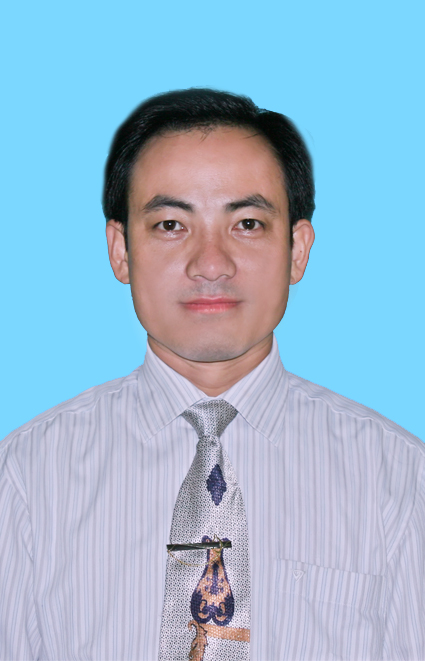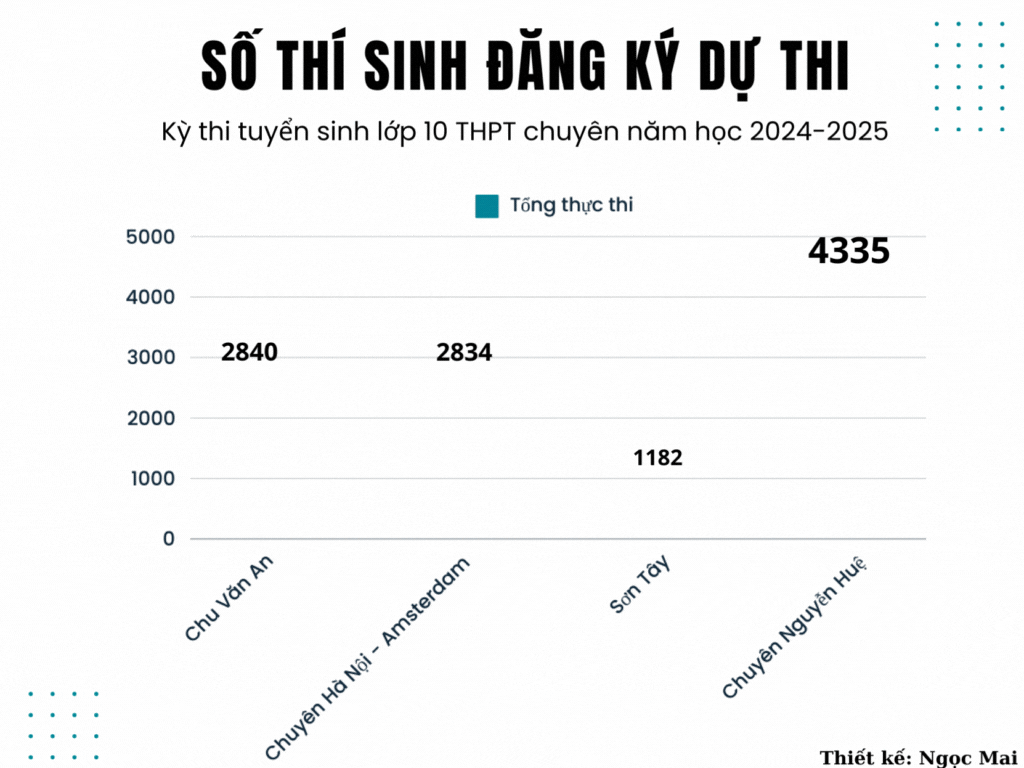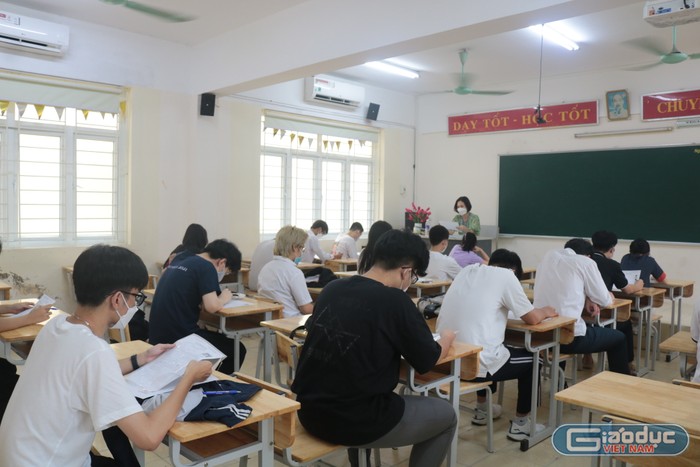
| ĐỀ THI THỬ SỐ 03 KÌ THI TUYỂN SINH VÀO LỚP 10 THPT NĂM HỌC: 2020-2021 MÔN THI: TIẾNG ANH Thời gian làm bài: 60 phút, không kể thời gian phát đề |
| Question 1 | A. kind | B. bit | C. kiss | D. kid |
| Question 2 | A. desired | B. invented | C. followed | D. answered |
| Question 3 | A. doctor | B. suggest | C. occur | D. deny |
| Question 4 | A. permission | B. pollution | C. attitude | D. suggestion |
| Question 5: A good night’s sleep will improve your concentrate. | |||
| A. good | B. sleep | C. improve | D. concentrate |
| Question 6: He wondered what one is the best option for him. | |||
| A. what | B. one | C. best | D. for |
| Question 7: His successful career inspires his son being a businessman. | |||
| A. successful | B. inspires | C. his | D. being |
| Question 8: Although the old man spoke very slowly and clearly, I could understand him. | |||
| A. Although | B. spoke | C. and | D. understand |
| Question 9: Harrison’s greatest attribute is his ability to work under pressure | |||
| A. mind | B. lack | C. capacity | D. passion |
| Question 10: Parents can influence the behavior of their children. | |||
| A. life | B. tradition | C. habit | D. attitude |
| Question 11: He asked his father where to cope with negative emotions. | |||
| A. creative | B. positive | C. native | D. decisive |
| Question 12: Over the last century, there have been many significant changes in the way we live | |||
| A. important | B. special | C. unimportant | D. serious |
| Question 13: At the moment, the team is_____their best performance in the final round. | |||
| A. to trying | B. to try | C. try | D. trying |
| Question 14: I have to leave now. Don’t forget_____ the door. | |||
| A. to lock | B. locking | C. lock | D. to locking |
| Question 15: If you_______your English every day, you’ll speak it fluently | |||
| A. use | B. will use | C. are used to | D. used to |
| Question 16: This is Mary ______ volunteers to come to Vietnam to teach the poor children. | |||
| A. , whom | B. , who | C. who | D. that |
| Question 17: I was on time, _________ everyone else was late. | |||
| A. so | B. but | C.for | D. and |
| Question 18: English is thought to be______ Math. | |||
| A. harder than | B. more hard than | C. as hard than | D. the hardest to |
| Question 19: Would you pass me ________ salt, please? | |||
| A. a | B. the | C. an | D. x |
| Question 20: It is ______ to participate in the “Preserving the past” project. | |||
| A. Interesting | B. Interested | C. Interest | D. Interestingly |
| Question 21: He _______ a bachelor’s degree in computer information systems in 1951. | |||
| A. forced | B. sent | C. took | D. gained |
| Question 22:Television______can enjoin various interesting programs by selecting the right channels . | |||
| A. lookers | B. watchers | C. viewers | D. seers |
| Question 23:“Let me help you with the box.” - “_______” |
|
| A. Yes. That’s very kind of you. | B. I’m sorry. I’m busy now. |
| C. What can I do for you? | D. No. You must not |
| Question 24: “How do you do?” “___________”. |
|
| A. How do you do? | B. Not too bad. |
| C. I’m well. Thank you. | D. Yeah, OK. |
| Changes in Food Habits Before Stone Age, people used to eat fruits, leaves and anything they found from the forest. However, this habit changed into hunting animals, preserving food items and planting and growing vegetables, which eventually led into farming different crops like maize, corn, and rice. People were healthy, they rarely had diseases and never needed extra exercise because their daily work kept their bodies running. At present, we have turned agriculture into a mass scale production, including machinery, technology and pesticides, all of which came in with the green revolution. With green revolution agriculture and the traditional farming culture turned upside down. As far nor now, farmers who are able to cope up with the multinational cooperation’s and their large-scale, expensive products, pesticides and high-yielding varieties of seeds, keep producing crops for the market. Yet the traditional, low-income farmers even today, especially in Asian countries, are in a dire state. Fast food is another major factor in modern food habits. Although many people find it convenient, it leads to many health conditions. Today people are unhealthy, needs medicine and functions on diets and exercise machines. |
| Question 25: Which of the following sentences is true about food habits in the past? |
| A. People in the past ate more fast food than they do today. B. People in the past ate healthy food so they rarely had diseases. C. People used large-scale, expensive products, pesticides and high-yielding varieties of seeds to keep producing crops for the market. D. People used to eat fruits, vegetables, food items from the market. |
| Question 26: According to the writer, in the past, why didn’t people need extra exercise? |
| A. Because they regularly ate fruits, leaves and anything they found from the forest. B. Because they used green revolution. C. Because their bodies kept running as a result of their daily work. D. Because they had the help from medicines. |
| Question 27: Farmers who have the ability to deal with the large-scale, expensive products of multinational corporation and pesticides, seeds _____ |
| A. keep producing crops to serve their families. B. stop producing crops because of their limited abilities. C. continue their producing crops for the market. D. turn into low-income farmers. |
| Question 28: What is NOT mentioned as a health condition people nowadays have to face up with? |
| A. become more and more unhealthy B. rely on medicines and functions on diets C. exercise machines D. have heart diseases |
| LIFE IN THE PAST VS LIFE IN THE PRESENT In the past, living conditions ___(29)___ not as comfortable as they are now. Besides, many people could not ___(30)___ afford household appliances like a fridge or a vacuum cleaner because those used to be luxurious goods. Another difference between living now and in the past is the fact that nowadays education is accessible to everyone. In the past men were mainly ___(31)___ only ones educated and women were not allowed into public or private schools. ___(32)___, nowadays it is much easier ___(33)___ the educational materials and the information you need – thanks to the Internet. We are able to speak to a friend who is on the other corner of the world because we are connected 24/7. Nevertheless, people had better relationships ___(34)___ the neighbors in years gone by. |
| Question 29 | A. were | B. was | C. had been | D. are |
| Question 30 | A. easy | B. easily | C. easily | D. easier |
| Question 31 | A. a | B. an | C. the | D. none |
| Question 32 | A. Despite | B. However | C. Although | D. Therefore |
| Question 33 | A. finding | B. find | C. to find | D. found |
| Question 34 | A. on | B. with | C. at | D. to |
| Question 35: He spent two hours doing his homework. |
| A. He did his homework two hours ago. B. He finished his homework two hours ago. C. He had his homework done in two hours. D. It took him two hours to do his homework. |
| Question 36: They would never have accepted his money if they had known his plans |
| A. They knew what he wanted to do, so they refused his money. B. They agreed with his wishes because they were glad to have his money. C. They didn’t know his plans and never took money from him. D. They took the money he offered them without realizing his plans. |
| Question 37: People say that prevention is better than cure. |
| A. That prevention is said is better than cure. B. It is said that prevention is better than cure. C. Prevention is better than cure is said by people. D. Prevention says to be better than cure. |
| Question 38: “Let’s go to the cinema on Saturday evening .” |
| A. On Saturday evening, we definitely will go to the cinema. B. It is on Saturday evening that we will go to the cinema. C. Going to the cinema on Saturday is really fun. D. Shall we go to the cinema on Saturday evening? |
| Question 39: This flat is so small that my family can not live in it. A. This flat is too small for my family. B. This flat is not small enough for my family. C. This flat is not very big for my family. D. This flat is not rather big for my family. |
| Question 40: Because it is snowing heavily, we can’t go out to play soccer. |
| A. Due to the heavy snow, we can’t go out to play soccer. B. Although it is snowing heavily, we go out to play. C. If it is snowing heavily, we will go out to play. D. Despite the heavy snow, we will go out to play. |
| 1. A | 2. B | 3. A | 4. C | 5. D | 6. A | 7. D | 8. A | 9. C | 10. D |
| 11. B | 12.C | 13. D | 14. A | 15. A | 16. C | 17.B | 18.A | 19.B | 20.A |
| 21. D | 22.C | 23. A | 24. A | 25. B | 26. C | 27. C | 28. D | 29. A | 30. C |
| 31. C | 32.B | 33.C | 34.B | 35.D | 36.D | 37. B | 38.D | 39. A | 40 .A |
Nguồn tin: Giáo viên: Nguyễn Trung Kiên (sưu tầm):
Ý kiến bạn đọc
Những tin mới hơn
Những tin cũ hơn
 Video hướng dẫn cấp Phiếu lý lịch tư pháp qua ứng dụng định danh và xác thực điện tử (VNeID) trên địa bàn thành phố Hà Nội.
Video hướng dẫn cấp Phiếu lý lịch tư pháp qua ứng dụng định danh và xác thực điện tử (VNeID) trên địa bàn thành phố Hà Nội.
 Hà Nội công bố số lượng thí sinh dự thi vào lớp 10 năm học 2024-2025
Hà Nội công bố số lượng thí sinh dự thi vào lớp 10 năm học 2024-2025
 Hà Nội: Cách tính điểm xét tuyển vào 10 trường công lập năm học 2024-2025
Hà Nội: Cách tính điểm xét tuyển vào 10 trường công lập năm học 2024-2025
 Gần 750 học sinh Tiểu học Thanh Oai giao lưu Viết chữ đẹp
Gần 750 học sinh Tiểu học Thanh Oai giao lưu Viết chữ đẹp
 Hội nghị tổng kết hội thi GVG cấp học Mầm non năm học 2023 - 2024
Hội nghị tổng kết hội thi GVG cấp học Mầm non năm học 2023 - 2024